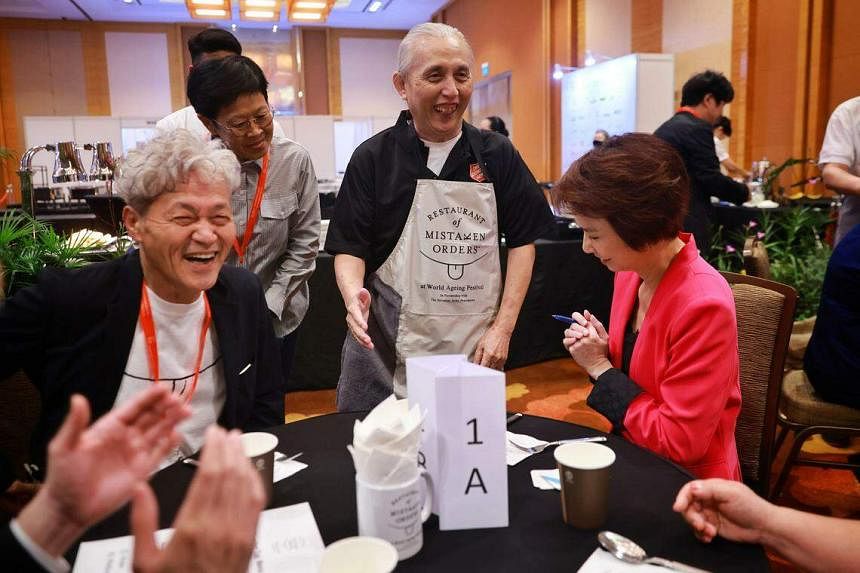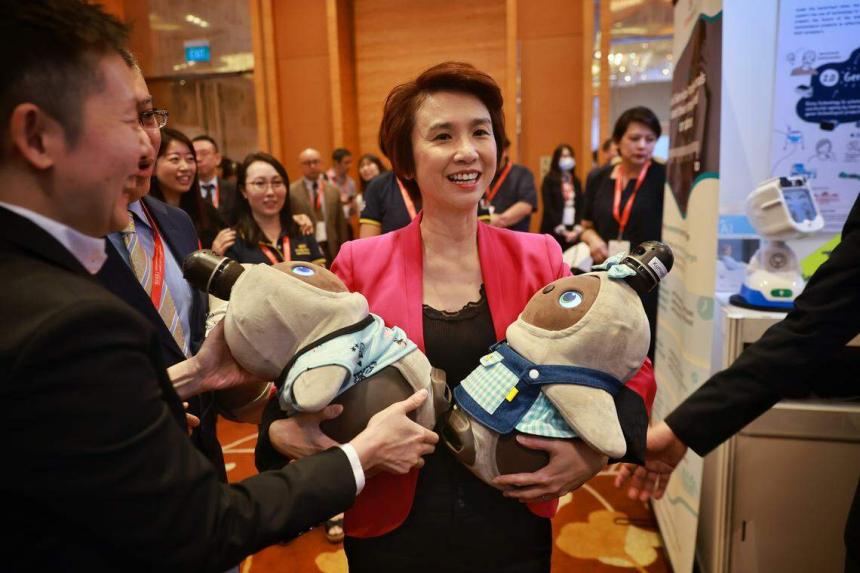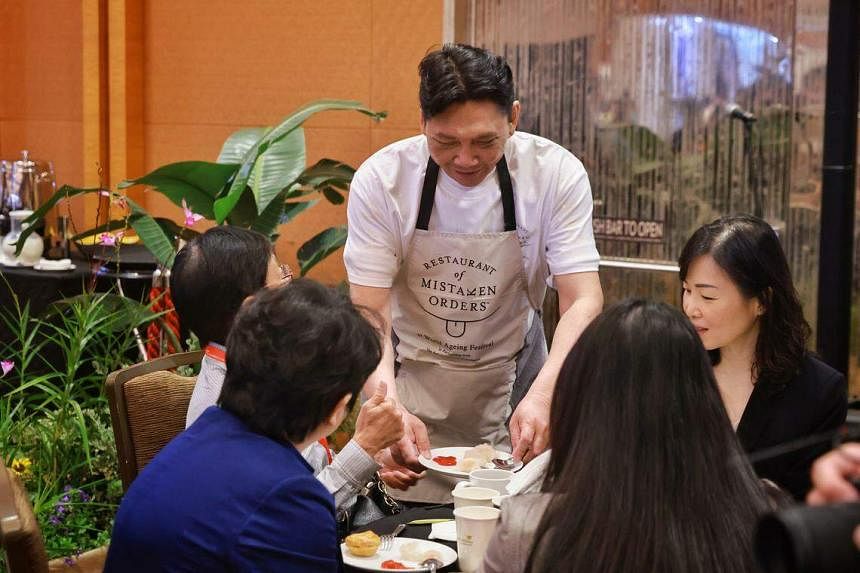World Ageing Festival to discover high-potential innovations for a greying population

SINGAPORE – Imagine you order a burger and fries, but settle for fried rice instead, because that is what the staff mistakenly served you.
That is the kind of “attitude and behaviour” that the organiser of the pop-up cafe, Restaurant of Mistaken Orders, hopes to encourage among people in a greying society.
Staffed mostly by older people living with dementia, the cafe aims to raise awareness about dementia and encourage people to experience what it is like to communicate with someone living with the condition.
Today, about 92,000 people are thought to be living with dementia in Singapore and this number is projected to increase to 152,000 by 2030.
“This unusual pop-up cafe is debuting for the first time outside of Japan, in partnership with The Salvation Army Peacehaven in Singapore. The aim is to spread dementia awareness and to make society just that little bit more open-minded, relaxed and kinder,” said Minister of State for Culture, Community and Youth Low Yen Ling on Wednesday.
She was speaking at the Ageing Asia 2023 – World Ageing Festival, where the cafe is located. The week-long festival is being held at the Marina Bay Sands Expo and Convention Centre.
Cafe founder Yukio Wada, 68, told The Straits Times that he had the idea to start the cafe in Japan after an encounter with a group of elderly people living with dementia – they promised to make burgers for him, but, when they returned from shopping, they came back with ingredients for gyoza, a Japanese dumpling.
“Everyone, including the staff of the elderly home, acted as if it was normal. The rest around me were eating with such gusto that it made me wonder if I had made the wrong order,” he said through an interpreter.
Working with Mr Shiro Oguni, a producer from broadcaster NHK, Mr Wada launched the pop-up cafe in Japan in September 2017, with crowdfunding help. Since its launch at RANDY, a restaurant in the Roppongi area of Tokyo, the pop-up cafe has travelled around the rest of the country.
As Singapore hits super-aged status in 2026, it will take “a whole-of-society effort” to tackle ageing in society and build homes where seniors can age well and live with dignity, said Ms Low, who is also Minister of State for Trade and Industry. According to the United Nations, a country is super-aged when 21 per cent of its population is aged 65 and older.
The Singapore Government has also taken steps “to roll out national plans and policies to enhance the country’s infrastructure for housing and caregiving”, Ms Low added.
These range from reviewing manpower policies and initiatives to transforming the healthcare system to better meet evolving healthcare needs and strengthening the social safety net with schemes such as Silver Support, CPF Life and CareShield Life.
“We recently refreshed Singapore’s Successful Ageing Plan, reaffirming our commitment to continue working with industry and community partners to ensure that our older persons age with dignity and purpose,” Ms Low said.
She said everyone has a role to play and “we must continue to encourage more partnerships between the public, private and people sectors”.

The Singapore University of Social Sciences (SUSS) has leveraged its deep expertise and wide network in gerontology to build Singapore’s human capital in this field, through training and developing highly specialised professionals.
An example is its Graduate Diploma in Gerontology, which offers holistic training for a career in the eldercare and silver sector.
The inaugural SUSS Geronpreneurship Innovation Festival – the first in Asia – was launched at the World Ageing Festival to discover and nurture high-potential innovations for a rapidly greying population in the region.
An innovation showcased at the festival is the use of artificial intelligence to develop a low-maintenance mechanical pet companion. Called Lovot, the rolling robot about the size of a pug is designed to be warm for a hug and has sensors that make it responsive to touch, mimicking a real-life pet. It is estimated to cost US$3,500 (S$4,700).
Dr Kelvin Tan, the head of SUSS’ minor in applied ageing studies, said the Lovot is currently being used at the Orange Valley Active Ageing Centre in a research trial. Since its introduction there in 2022, there have been requests for such “gerontechnology” pilots from dementia care organisations and other community places, he added.
In his welcome address, Professor Robbie Goh, provost of SUSS, said the university received in 2022 a “major boost of $10 million” from the Ngee Ann Kongsi (NAK) to set up the NAK Social Impact Hub to enable the scaling up of efforts to promote successful ageing.

One of the two key outcomes of this initiative is community-based senior friendly projects, including the mass resettlement of 400 households that had to move out of old rental blocks scheduled to be demolished as part of urban redevelopment.
“Our students, alumni and faculty worked closely with the Housing Board, People’s Association and community partners to journey with affected vulnerable seniors to help them settle into their new homes over 12 months,” Prof Goh said.
The second outcome was spearheading eldercare research with regional and global partners.
In addition, SUSS and the World Health Organisation (WHO) Collaborating Centre for Community Health Services have trained the first batch of assessors in Singapore in the use of the WHO Integrated Care Assessment for Older People (Icope), to better gauge functional capabilities of older adults and recommend the best personalised care.
Countries where Icope has been deployed are France, Andorra, China, India, Italy, Kenya, Mexico, Qatar and Vietnam.
Save more every month with our annual plan: unlimited access, better price.
Join ST's Telegram channel and get the latest breaking news delivered to you.






No comments:
Post a Comment